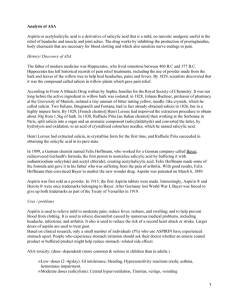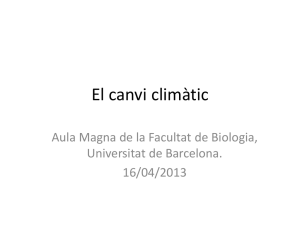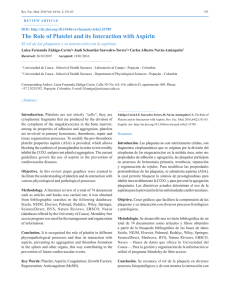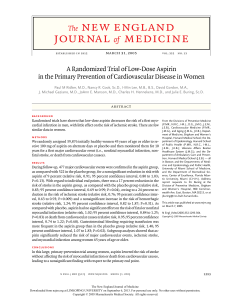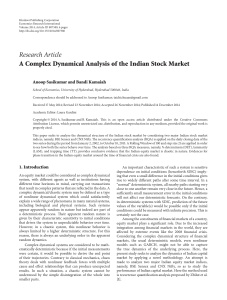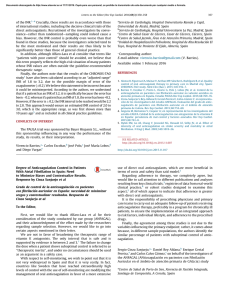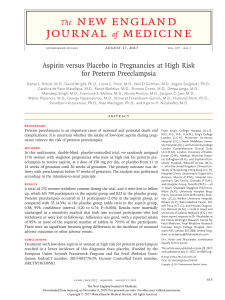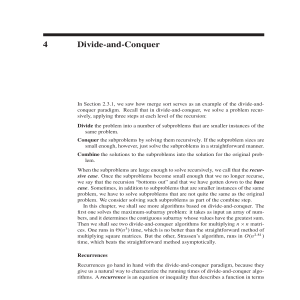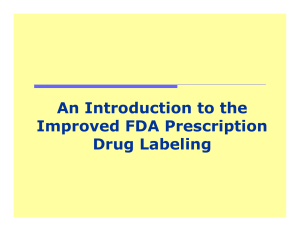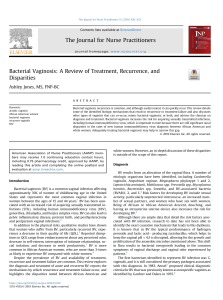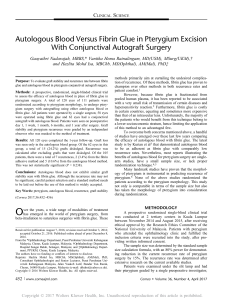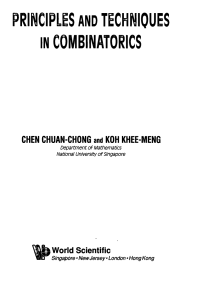Does aspirin reduce recurrence after completing
Anuncio
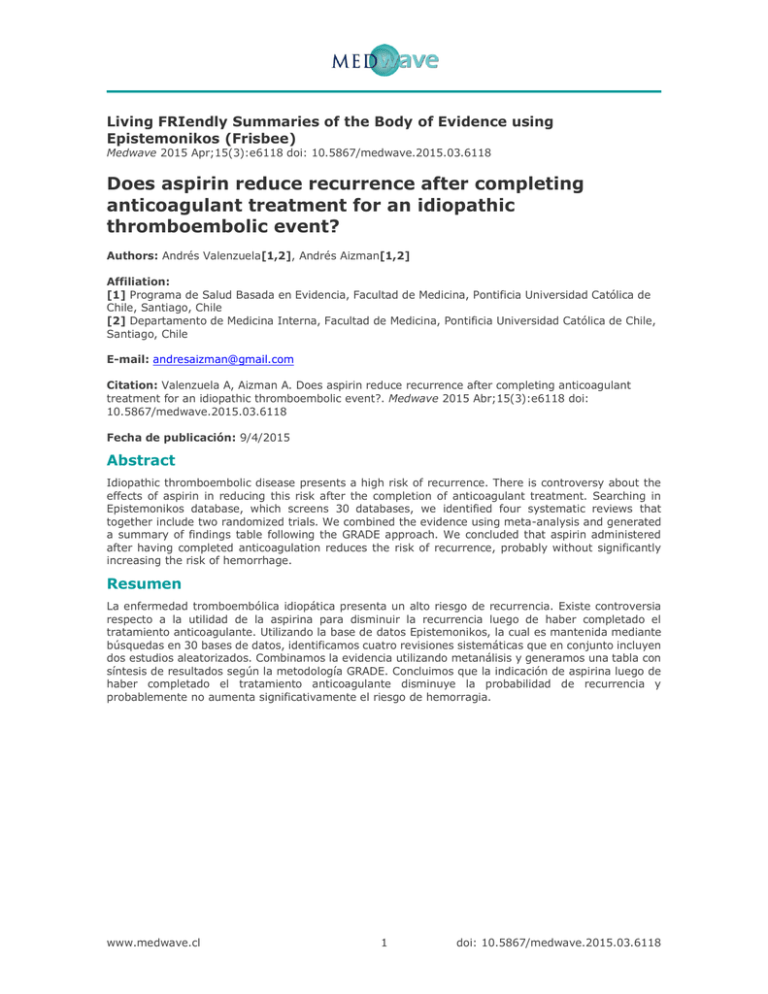
Living FRIendly Summaries of the Body of Evidence using Epistemonikos (Frisbee) Medwave 2015 Apr;15(3):e6118 doi: 10.5867/medwave.2015.03.6118 Does aspirin reduce recurrence after completing anticoagulant treatment for an idiopathic thromboembolic event? Authors: Andrés Valenzuela[1,2], Andrés Aizman[1,2] Affiliation: [1] Programa de Salud Basada en Evidencia, Facultad de Medicina, Pontificia Universidad Católica de Chile, Santiago, Chile [2] Departamento de Medicina Interna, Facultad de Medicina, Pontificia Universidad Católica de Chile, Santiago, Chile E-mail: andresaizman@gmail.com Citation: Valenzuela A, Aizman A. Does aspirin reduce recurrence after completing anticoagulant treatment for an idiopathic thromboembolic event?. Medwave 2015 Abr;15(3):e6118 doi: 10.5867/medwave.2015.03.6118 Fecha de publicación: 9/4/2015 Abstract Idiopathic thromboembolic disease presents a high risk of recurrence. There is controversy about the effects of aspirin in reducing this risk after the completion of anticoagulant treatment. Searching in Epistemonikos database, which screens 30 databases, we identified four systematic reviews that together include two randomized trials. We combined the evidence using meta-analysis and generated a summary of findings table following the GRADE approach. We concluded that aspirin administered after having completed anticoagulation reduces the risk of recurrence, probably without significantly increasing the risk of hemorrhage. Resumen La enfermedad tromboembólica idiopática presenta un alto riesgo de recurrencia. Existe controversia respecto a la utilidad de la aspirina para disminuir la recurrencia luego de haber completado el tratamiento anticoagulante. Utilizando la base de datos Epistemonikos, la cual es mantenida mediante búsquedas en 30 bases de datos, identificamos cuatro revisiones sistemáticas que en conjunto incluyen dos estudios aleatorizados. Combinamos la evidencia utilizando metanálisis y generamos una tabla con síntesis de resultados según la metodología GRADE. Concluimos que la indicación de aspirina luego de haber completado el tratamiento anticoagulante disminuye la probabilidad de recurrencia y probablemente no aumenta significativamente el riesgo de hemorragia. www.medwave.cl 1 doi: 10.5867/medwave.2015.03.6118 Methods We used Epistemonikos database, which is maintained by screening more than 30 databases, to identify systematic reviews and their included primary studies. With this information, we generated a structured summary using a pre-established format, which includes key messages, a summary of the body of evidence (presented as an evidence matrix in Epistemonikos), meta-analysis of the total of studies, a summary of findings table following the GRADE approach and a table of other considerations for decision-making. Problem Patients with idiopathic venous thromboembolism have a high risk of recurrence once anticoagulation treatment is stopped. These patients also have a greater risk of cardiovascular events compared with the general population (myocardial infarction, stroke). Use of aspirin could lower the venous and arterial thromboembolic risk without increasing the risk of hemorrhage. Current guidelines do not mention the role of aspirin as a secondary prevention strategy in these patients Key messages The use of aspirin after completing anticoagulant treatment decreases the risk of recurrence, and probably does not increase the risk of hemorrhage in patients with a first idiopathic thromboembolic event. Aspirin has a favorable risk-benefit balance and a low cost, so it may be considered in these patients, especially in those with a high risk of hemorrhage or those who want to stop anticoagulation. About the body of evidence for this question What is the evidence. See evidence matrix in Epistemonikos later. We found four systematic reviews [1],[2],[3],[4] that evaluated this question, which included two randomized controlled trials [5],[6]. What types of patients were included. Patients with a first idiopathic thromboembolic event (deep vein thrombosis and/or pulmonary embolism) that completed initial anticoagulation (warfarin, low molecular weight heparin or new anticoagulants). What types of interventions were included. Aspirin 100 mg once daily for at least two years. What types of outcomes were measured. Recurrencia tromboembólica; eventos vasculares mayores (infarto agudo al miocardio, accidente cerebrovascular); mortalidad cardiovascular; mortalidad global; hemorragia mayor; hemorragia menor clínicamente relevante. www.medwave.cl 2 doi: 10.5867/medwave.2015.03.6118 Summary of findings The following information is based on two randomized trials that included 1224 patients. Use of aspirin after completing anticoagulant treatment decreases risk of recurrence, and probably leads to little or no increase in the risk of hemorrhage in patients with a first idiopathic thromboembolic event. Use of aspirin in these cases might lead to a mild reduction in mortality but the certainty of the evidence is low. Aspirin for reducing recurrence after completing anticoagulant treatment for an idiopathic thromboembolic event www.medwave.cl 3 doi: 10.5867/medwave.2015.03.6118 Otras consideraciones para la toma de decisión To whom this evidence does and does not apply Patients that completed anticoagulation after a first idiopathic thromboembolic event. Does not apply to patients with provoked events (cancer, surgery) or patients with more than one previous event. About the outcomes included in this summary This summary includes outcomes that in our criteria are important for decision making in these patients. These outcomes are also considered in trials and clinical guidelines. Balance between benefits and risks, and certainty of the evidence There is high certainty that aspirin reduces the risk of thromboembolic recurrence in these patients without increasing the risk of bleeding. More patients included in future studies could clarify the evidence about the effect of aspirin on cardiovascular events and mortality. What would patients and their doctors think about this intervention Because of high recurrence rate, effectiveness and low risk of the intervention, aspirin seems a good alternative when anticoagulation is stopped. Physicians will probably choose this strategy, especially in patients with a high bleeding risk or in those who want to suspend anticoagulation. Patients will probably adhere to this efective and low cost intervention. In patients with a high risk of recurrence and low bleeding risk, anticoagulation seems to have a preponderant role. Resource considerations Low cost of the intervention should not lead to restrictions in decision making. Differences between this summary and other sources Clinical guidelines do not mention the potential role of aspirin in prevention of thromboembolic recurrence. Could this evidence change in the future? The probability that new studies change the conclusions of this summary with respect to thromboembolic recurrence is very low given the high certainty of the evidence. New studies could clarify the role of aspirin on the reduction of other outcomes as bleeding, mortality and cardiovascular events but as far as we know there are no ongoing studies on this topic. www.medwave.cl 4 doi: 10.5867/medwave.2015.03.6118 How we conducted this summary Using automated and collaborative means, we compiled all the relevant evidence for the question of interest and we present it as a matrix of evidence. Follow the link to access the interactive versión Aspirin for reducing recurrence after completing anticoagulant treatment for an idiopathic thromboembolic event www.medwave.cl 5 doi: 10.5867/medwave.2015.03.6118 References Notes 1. Castellucci LA, Cameron C, Le Gal G, Rodger MA, Coyle D, Wells PS, et al. Efficacy and safety outcomes of oral anticoagulants and antiplatelet drugs in the secondary prevention of venous thromboembolism: systematic review and network meta-analysis. BMJ. 2013 Aug 30;347:f5133. | CrossRef | PubMed | 2. Castellucci LA, Le Gal G, Rodger MA, Carrier M. Major bleeding during secondary prevention of venous thromboembolism in patients who have completed anticoagulation: a systematic review and meta-analysis. J Thromb Haemost. 2014;12(3):3448. | CrossRef | PubMed | 3. Simes J, Becattini C, Agnelli G, Eikelboom JW, Kirby AC, Mister R, et al. Aspirin for the prevention of recurrent venous thromboembolism: the INSPIRE collaboration. Circulation. 2014 Sep 23;130(13):106271. | CrossRef | PubMed | 4. Sobieraj DM, Coleman CI, Pasupuleti V, Deshpande A, Kaw R, Hernandez AV. Comparative efficacy and safety of anticoagulants and aspirin for extended treatment of venous thromboembolism: A network meta-analysis. Thromb Res. 2015 Mar 4. pii: S0049-3848(15)001048. | CrossRef | PubMed | 5. Becattini C, Agnelli G, Schenone A, Eichinger S, Bucherini E, Silingardi M, et al. Aspirin for preventing the recurrence of venous thromboembolism. N Engl J Med. 2012 May 24;366(21):195967. | CrossRef | PubMed | 6. Brighton TA, Eikelboom JW, Mann K, Mister R, Gallus A, Ockelford P, et al. Low-dose aspirin for preventing recurrent venous thromboembolism. N Engl J Med. 2012 Nov 22;367(21):1979-87. | CrossRef | PubMed | The upper portion of the matrix of evidence will display a warning of “new evidence” if new systematic reviews are published after the publication of this summary. Even though the project considers the periodical update of these summaries, users are invited to comment in Medwave or to contact the authors through email if they find new evidence and the summary should be updated earlier. After creating an account in Epistemonikos, users will be able to save the matrixes and to receive automated notifications any time new evidence potentially relevant for the question appears. The details about the methods used to produce these summaries are described here http://dx.doi.org/10.5867/medwave.2014.06.5997. Epistemonikos foundation is a non-for-profit organization aiming to bring information closer to health decisionmakers with technology. Its main development is Epistemonikos database (www.epistemonikos.org). These summaries follow a rigorous process of internal peer review. Conflicts of interest The authors have completed the ICMJE uniform disclosure form for potential conflicts of interest, (available on request from the corresponding author), and declare not having conflicts of interest with the subject of the article. Author address: Facultad de Medicina Pontificia Universidad Católica de Chile Lira 63, Santiago Centro Chile Esta obra de Medwave está bajo una licencia Creative Commons Atribución-No Comercial 3.0 Unported. Esta licencia permite el uso, distribución y reproducción del artículo en cualquier medio, siempre y cuando se otorgue el crédito correspondiente al autor del artículo y al medio en que se publica, en este caso, Medwave. www.medwave.cl 6 doi: 10.5867/medwave.2015.03.6118
